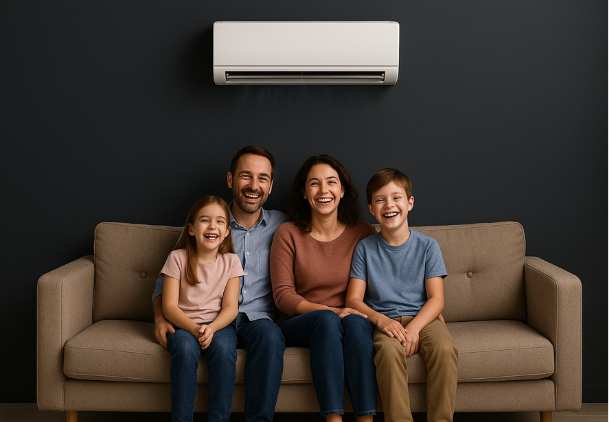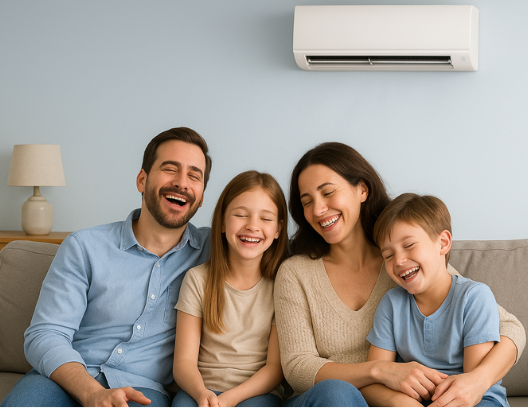How to Calculate the Exact AC Size Your Calgary Home Needs
How to Calculate the Exact AC Size Your Calgary Home Needs More Posts Beyond Rules of Thumb: Precision AC Sizing The most critical decision in AC installation isn’t brand or features—it’s proper sizing. At Purcell Heating and Air, we’ve found that correctly sized systems deliver superior comfort, efficiency, and longevity. Undersized units strain to cool your home while oversized systems cycle frequently, increasing wear and wasting energy. The Manual J Calculation: The Industry Standard Professional AC sizing follows the Air Conditioning Contractors of America’s Manual J load calculation. This comprehensive assessment accounts for Calgary’s specific climate conditions and your home’s unique characteristics. Key Factors in Precise AC Sizing Total Square Footage Primary determinant of cooling capacity requirements Different zones require different calculations Home Construction and Insulation R-value of insulation in walls, ceilings, and floors Window efficiency and total glazed area Air infiltration rates Calgary-Specific Climate Data Design temperatures based on historical weather patterns Humidity considerations for our dry climate Seasonal temperature variations Internal Heat Sources Occupants (each person generates approximately 100 BTUs/hour) Appliances and electronics Lighting fixtures Orientation and Sun Exposure South and west-facing rooms typically require more cooling Shade trees and landscaping impact The Calculation Process While professional Manual J calculations are complex, here’s a simplified approach to estimate your needs: Calculate Base BTU Requirements Multiply your home’s square footage by 25 BTUs Example: 2,000 sq ft × 25 = 50,000 BTUs Apply Calgary-Specific Adjustments Add 10% for homes with high ceilings Add 5% for poor insulation or subtract 5% for excellent insulation Add 15% for primarily western exposure Convert to Tonnage Divide the BTU figure by 12,000 (1 ton = 12,000 BTUs) Example: 50,000 ÷ 12,000 = 4.16 tons Strategic Rounding Round to the nearest half-ton (3.5, 4, 4.5, etc.) In borderline cases, consider the smaller option for Calgary’s climate The Precision Difference At Purcell Heating and Air, we conduct professional Manual J calculations for every installation. This precision approach typically reveals that many Calgary homes have oversized systems, leading to: Short cycling that reduces equipment life Poor humidity control Inconsistent temperatures Higher than necessary energy costs Future-Proofed Sizing Considerations When calculating your home’s cooling needs, we also assess: Planned renovations or additions Changing usage patterns Improvements to insulation or windows Climate change projections for Calgary Connect with Calgary’s Cooling Experts For a precise, professional calculation of your home’s exact cooling requirements, contact Purcell Heating and Air at (403) 312-9099. Visit our AC installation service page to learn about our professional sizing and installation process. Calgary homeowners can find local information at www.purcellheating.ca/calgary/. Blog Post 3: Assess Your Current Cooling Strategy: Is Your Calgary Home Ready for an Upgrade? Meta Title: 10 Signs You Need AC Replacement in Calgary | Purcell Heating and Air Meta Description: Discover if your Calgary home needs an AC upgrade with our 10-point assessment. Professional installation at www.purcellheating.ca/our-services/ac-installation/ Slug: signs-need-ac-replacement-calgary-home-cooling Strategic Cooling Assessment Your home’s cooling system represents a significant investment in comfort and property value. Knowing when to upgrade requires a pragmatic assessment of your current system’s performance, efficiency, and condition. At Purcell Heating and Air, we help Calgary homeowners identify the precise moment when replacement delivers superior value compared to continued repairs. 10 Signs Your Calgary Home Needs an AC Upgrade Age of Equipment Most AC systems have a 15-20 year functional lifespan Systems installed before 2006 operate at significantly lower efficiency standards Equipment over 15 years old warrants careful evaluation Rising Energy Costs Cooling costs increasing despite similar usage patterns Efficiency losses of 5-10% per year in aging systems Monthly energy consumption significantly higher than similar homes Frequent Repairs More than two repair calls in the past two seasons Repair costs exceeding 50% of replacement value Difficulty sourcing replacement parts Inconsistent Cooling Performance Significant temperature variations between rooms Inability to maintain set temperature during peak summer conditions Extended run times without achieving comfort Humidity Control Issues Home feels clammy or excessively dry Condensation on windows during operation Mold or mildew growth in air ducts Noise Level Increase Grinding, squealing, or rattling sounds during operation Louder than normal operation compared to previous seasons Unusual noises at startup or shutdown R-22 Refrigerant Dependency Systems using R-22 (phased out since 2020) Refrigerant leaks becoming common Extremely high cost of R-22 refrigerant recharging Smart Home Incompatibility Unable to integrate with modern thermostats Lack of variable operation capabilities No energy monitoring functionality Inadequate Air Filtration System unable to accommodate modern air purification Increased allergy symptoms during operation Visible dust accumulation shortly after cleaning Changed Cooling Requirements Home renovations or additions Increased occupancy New heat-generating equipment installed The Financial Assessment Beyond performance indicators, conduct this financial evaluation: Repair-to-Replace Ratio Calculate: Cost of repair ÷ Cost of replacement If ratio exceeds 0.5, replacement generally offers better value Remaining Life Calculation Average life (18 years) – current age = remaining life Divide annual energy savings from new system by replacement cost If energy savings percentage exceeds remaining life percentage, upgrade is financially justified Utility Rebate Eligibility Current provincial and municipal incentives Manufacturer rebates for high-efficiency replacements Tax benefits for energy-efficient upgrades Future-Proofed Decision Making Consider these forward-looking factors in your assessment: Increasing summer temperature trends in Calgary Rising electricity costs Smart home integration plans Environmental regulations affecting refrigerants Home value implications for potential sale Connect with Calgary’s Cooling Experts Ready for a professional assessment of your current cooling strategy? Contact Purcell Heating and Air at (403) 312-9099. For detailed information about our replacement and installation services, visit our AC installation page. Calgary residents can find local service information at www.purcellheating.ca/calgary/. How to Calculate the Exact AC Size Your Calgary Home Needs The Need-to-Know Guide to AC Installation Costs in Calgary for 2025 Split vs. Central vs. Ductless: Which AC System Delivers Superior Value for Calgary Homes? Assess Your Current Cooling Strategy: Is Your Calgary Home Ready for an Upgrade? Top 10 AC Systems for Calgary Homes: Efficiency Ratings Compared




